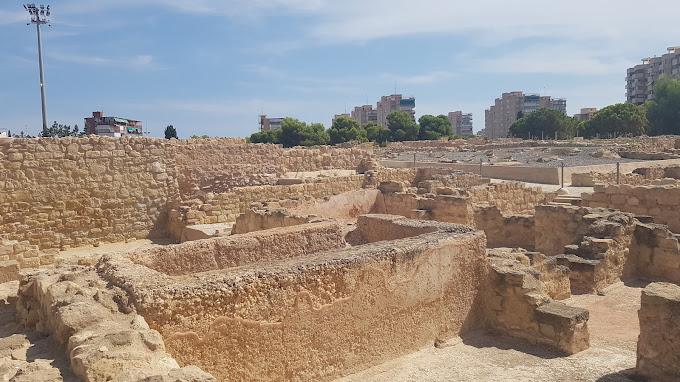Nestled in the heart of Alicante, Spain, the Lucentum Archaeological Site offers a fascinating glimpse into the ancient Mediterranean civilizations that once thrived on the Iberian Peninsula. This historical site, once a bustling Roman and pre-Roman settlement, serves as a crucial link to understanding the rich tapestry of cultures that shaped the region's history. The preservation and ongoing excavations of Lucentum not only highlight its significance during antiquity but also enhance our understanding of urban development in ancient times.
Historical Overview
Lucentum, known historically as "Tossal de Manises," is situated in the modern-day area of La Albufereta in Alicante. It is believed that the site was originally settled by Iberian tribes before falling under the influence of the Greek and subsequently the Carthaginians. The zenith of Lucentum's prominence, however, came under Roman rule when it became an important civic and economic center around the 1st century BCE. The city thrived due to its strategic position along the Mediterranean trade routes, facilitating the exchange of goods, cultures, and ideas.
Archaeological Discoveries
The excavations at Lucentum began in earnest in the early 20th century and have since unveiled numerous structures that illustrate the city's historical importance. Among the key findings are the remains of the forum, a central square that served as a civic hub, and the baths, which highlight the Roman emphasis on public health and social gatherings. Additionally, residential areas have been uncovered, offering insights into the daily lives of its ancient inhabitants, including their diets, domestic practices, and social structures.
One of the most significant aspects of Lucentum is its defensive walls, which were essential for protecting the city against invasions and pirate attacks. These fortifications reflect the turbulent times during the late Roman Republic and the early Roman Empire, when control of the Mediterranean was crucial for trade and military dominance.
The Importance of Lucentum in Roman and Iberian Culture
Lucentum's role as a cultural crossroads is evidenced by the diverse artifacts found at the site, including Iberian pottery, Roman coins, and Greek ceramics. These items not only depict the daily activities and economic conditions of the city but also illustrate the blend of cultural influences that characterized the region. The coexistence and synthesis of Roman and Iberian cultures are particularly noteworthy, as they highlight the processes of cultural assimilation and resistance that occurred throughout the Roman Empire.
Preservation and Education
Today, the Lucentum Archaeological Site is protected as a cultural heritage site, ensuring its preservation for future generations. Efforts by local and international organizations focus on maintaining the site's integrity while making it accessible to the public. Educational programs and guided tours are offered to help visitors appreciate the historical and cultural significance of the site. These initiatives are vital for fostering a broader understanding and appreciation of Mediterranean archaeology.
Contemporary Relevance
The study of Lucentum extends beyond historical curiosity; it provides valuable lessons on the urbanization, cultural integration, and economic dynamics of ancient societies. Urban planners and archaeologists can draw parallels between the city planning of Lucentum and modern urban development, particularly in the areas of public infrastructure and community spaces. Furthermore, Lucentum serves as a reminder of the importance of cultural heritage in contemporary society, emphasizing the need to preserve such sites amidst rapid urbanization and environmental challenges.
Conclusion
The Lucentum Archaeological Site in Alicante is more than just a window into the past; it is a testament to human resilience, ingenuity, and the enduring legacy of cultural interchange. As excavations and research continue, each layer of soil unearthed at Lucentum promises to reveal further secrets about the ancient world, offering insights not only into the history of Spain but also into the broader narrative of Mediterranean civilization. For historians, archaeologists, and visitors alike, Lucentum remains a beacon of historical discovery and cultural pride, a priceless jewel in the crown of Alicante's heritage.
Frequently Asked Questions (FAQs)
What was Lucentum?
Lucentum was an ancient city located in present-day Alicante, Spain, known for its strategic importance during the Roman and pre-Roman periods
Where is the Lucentum Archaeological Site located?
The site is located in the La Albufereta area of Alicante, offering insights into the city's historical significance as a Mediterranean trade hub
What have the excavations at Lucentum revealed?
Frequently asked questions (FAQ) or Questions and Answers (Q&A), are listed questions and answers, all supposed to be commonly asked in some context, and pertaining to a particular topic.
Why is the Lucentum Archaeological Site important?
Lucentum is crucial for understanding the cultural integration and urban development of ancient Mediterranean civilizations, particularly the interaction between Roman and Iberian cultures
How can I visit the Lucentum Archaeological Site?
Visitors can explore the site through guided tours and educational programs designed to provide a comprehensive understanding of its historical and cultural context
